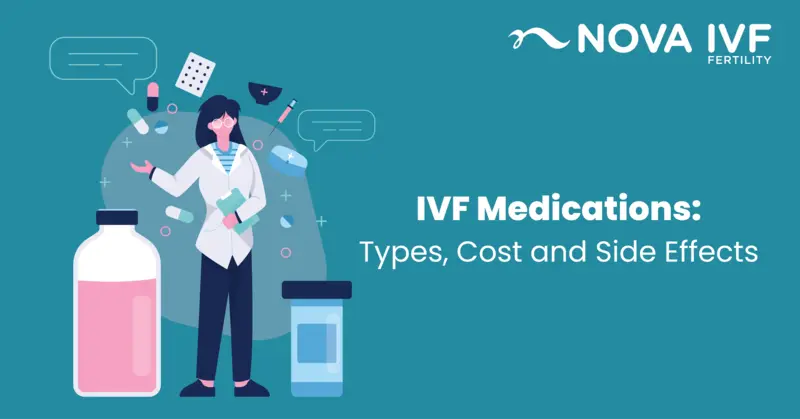Guide on IVF Medications

In vitro fertilisation (IVF), a seemingly simple procedure, can be complex and confusing for many people. In addition to learning about the human reproductive system and how it works, people going through IVF treatment are also required to understand the medications used in IVF.
IVF medications play a key role in the IVF journey. Thus, it is important for you to understand types of IVF medications and side effects and risks associated with it.
Here are the different types of medications used in IVF:
1. Ovarian Stimulation Medication
These type of IVF medications enable your body to mature more than 1 egg at a time. Such type of medication may include follicle-stimulation hormone (FSH), or luteinising hormone, or a combination of both these hormones.
2. Medication to Mature Eggs
These types of medication encourage the follicles or fluid-filled sacs containing eggs in the ovaries to mature for egg retrieval. Human chorionic gonadotropin (hCG) may be used for this stage. The common duration of administration of these medications is about 8-14 days.
3. Medication to Control the Premature Ovulation
These medications are used to suppress the body’s natural menstrual cycle and prevent it from releasing the eggs before they are fully mature.
4. Medication for Endometrial Thickening
This type of IVF medication is usually required by women who do not have optimal endometrial lining, which can gravely impact the chances of success of an IVF cycle. Some of these medications may also be used a precaution on the day of your egg retrieval or embryo transfer.
What Are the Common IVF Medications Taken During the IVF Process?
Most of the medications used in IVF are available in the form of injections, while others may be available as a nasal spray or topical gel. Below-mentioned IVF medication list includes commonly used medicines for IVF treatment:
1. Follicle-Stimulating Hormone (FSH)
These are used to stimulate the growth and maturation of follicles in the ovaries.
2. Gonadotropin-Releasing Hormone Agonists (GnRH Agonists)
These medication help prevent premature ovulation and release of eggs by the body. They work by suppressing the body’s production of hormones. There are two types of GnRH agonists used in IVF treatment:
- Lupron
- Lupride
3. Gonadotropin-Releasing Hormone Antagonists (GnRH Antagonists)
Another type of medication that suppresses the body’s natural production of reproductive hormones, GnRH antagonists work more quickly than GnRH agonists.
4. Human Chorionic Gonadotropin (hCG)
This IVF medication is usually administered after embryo transfer and plays an important role in preparing the body for embryo transfer.
5. Menopur
This IVF medication also stimulates the growth and maturation of multiple follicles in an IVF cycle.
6. Progesterone
This medication helps in increasing endometrial thickness to support embryo implantation after transfer.
7. Estrogen
Depending on your individual circumstances, your fertility specialist may prescribe estrogen to help stimulate growth and development of eggs.
8. Androgens
Women who have not responded well to ovarian stimulation may be prescribed androgen supplements. These help with follicle growth in specific individuals.
Apart from the ones mentioned above, your fertility specialist may also perceive the following medications:
- Antibiotics to control any bacteria that may have a negative influence after embryo implantation
- Parlodel to reduce the amount of prolactin released by the pituitary gland in case your infertility is linked to this hormone’s overproduction
- Dexamethasone to limit the presence of excessive androgens in the body
- Clomid to support ovarian stimulation in women who experience lengthy menstrual cycles and infrequent periods
- Supplements of vitamins and minerals
- Muscle relaxants offered prior to embryo transfer
- Anaesthesia for egg or oocyte retrieval
What Are the Costs of IVF Medications?
The average cost of IVF medications in India can range from ₹60,000 to ₹2,50,000. However, IVF medications’ price can vary based on your location, preferred brand of medicine, and other factors.
IVF medications are considered one of the major costs of an IVF treatment. Usually, health insurance plans do not cover IVF treatment costs; however, you are advised to check with your insurance provider to be sure.
Risks & Side Effects of IVF Medications
IVF medications manipulate the body’s natural menstrual cycle to produce multiple mature eggs in 1 IVF cycle according to a controlled timeline. Here is a list of side effects associated with IVF medications:
- Abdominal pain
- Allergic reactions
- Bloating
- Changes in the cervical mucus
- Diarrhoea
- Dizziness
- Ectopic pregnancy where the foetus is implanted outside the uterus
- Frequent mood swings
- Headaches
- Hot flashes
- Increased appetite
- Increasing weight
- Irritability
- Mild constipation
- Multiple pregnancies
- Nausea
- Night sweats
- Ovarian hyperstimulation syndrome (OHSS)
- Ovarian torsion or the twisting of ovaries over its supporting ligaments
- Restlessness
- Temporary blurred vision
- Tender breasts
Please note the OHSS is a serious condition that can become life-threatening as well. If you experience any severe symptoms, consult your fertility specialist or your healthcare provider immediately.
Conclusion
Your IVF medication plan can look different from another woman going through IVF treatment. Some of the IVF medications are available in the form of nasal sprays, oral tablets, vaginal medicines, and topical gels while others are usually administered in the form of injections. These injections are either given subcutaneously (through under the skin) or intramuscularly (through the muscles).
If you have any doubts about IVF medications or the treatment process, it is best to clear them out with your fertility specialist before moving forward.
FAQS on IVF Medications
Q. For how long do I need to take IVF medications?
A. This may vary from person to person, but usually you will be given IVF medications for about 1-2 weeks.
Q. How can I know if the medications are working or not?
A. During your IVF treatment, your fertility specialist will call you in for regular check-ups to monitor your progress. You may also experience some side effects of IVF medication, such as mood swings and irritability, during the procedure.
Q. How IVF medications work?
A. IVF medications work by suppressing the body’s natural menstrual cycle and stimulating ovaries to produce multiple mature eggs. They prevent premature ovulation as well during an IVF cycle.
 Infertility Counselling
Infertility Counselling Female Infertility Treatment
Female Infertility Treatment Andrology Treatment
Andrology Treatment Fertility Enhancing Surgeries - Female
Fertility Enhancing Surgeries - Female Fertility Enhancing Surgeries - Male
Fertility Enhancing Surgeries - Male Endoscopy Treatment
Endoscopy Treatment IUI Treatment
IUI Treatment IVF Treatment
IVF Treatment ICSI Treatment
ICSI Treatment Advanced IVF Solutions
Advanced IVF Solutions Embryology
Embryology Vitrification Egg, Embryo, Sperm Freezing
Vitrification Egg, Embryo, Sperm Freezing Preimplantation Genetic Testing (PGT)
Preimplantation Genetic Testing (PGT) Donation Program Embryo / Egg / Sperm
Donation Program Embryo / Egg / Sperm Self-cycleTM IVF
Self-cycleTM IVF

 Self-cycleTM IVF
Self-cycleTM IVF










